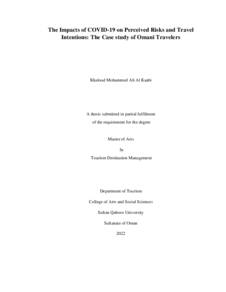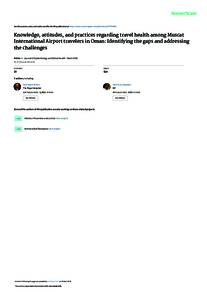Document
The Impacts of COVID-19 on perceived risks and travel intentions : the case study of Omani travelers.
Publisher
Sultan Qaboos University.
Gregorian
2022
Language
English
English abstract
In the past two decades, the world has experienced many unexpected crisis and the tourism
sector is vulnerable to all these natural and man-made crises. These crises involve
earthquakes, extreme climates, tsunamis, terrorist activity, diseases, and safety concerns.
Diseases and health crises have the greatest influence on the tourism economy and travel
industry. COVID-19 is an ongoing global pandemic with a widespread influence on the
tourism sector around the world. Understanding the relationships between risk perceptions
and intent to travel during this health pandemic is essential to enhance tourism demand
and help destination recovery. In reviewing tourism literature, it is found that there is a
limited amount of research on travelers' perceptions of risk and their travel intentions
during the outbreak of COVID-19 and specifically in Oman. Hence, this thesis aims to
explore the impacts of the COVID-19 on Omani travelers' perceived risks and their future
travel intentions. Filling these gaps aids to provide valuable insights into the relationship
between travel intentions and perceptions of risk during health crises. In order to explore
the influence of risk perception and intent to travel, this study relies on a quantitative
approach. Convenience sampling were used to gather data from Omani travelers through
online questionnaires that were distributed inside and outside SQU via WhatsApp and
SQU mail. The study yielded 542 online questionnaires. Performing the method of PLS SEM (Partial Least Squares-Structural Equation Modeling) using SmartPLS 2.0.M3 and
SPSS software helps to develop and evaluate the study model to give a thorough
knowledge of the effect of perception of risks on future travel intentions and the other
factors that influence travel intentions.
The findings of the study indicate that social risk and psychological risk have a significant
and negative impact on travel intention, health risks have a positive and significant impact
on travel intention while financial risk did not have significant effect on travel intention.
It was found that the importance and strength of these relationships vary based on media
exposure, past experience and participants' sociodemographic characteristics. Thus, this
study helps tourism stakeholders to enhance their current plans and programs and adapt
new marketing strategies in order to stimulate and improve the international and domestic
tourism market.
Member of
Resource URL
Arabic abstract
خلال العقدين الماضيين، عصفت بالعالم أحداث مأساوية وكوارث غير متوقعة، وتلقي هذه الكوارث بأثرها على قطاع السياحة سواء كانت كوارث طبيعية أو تلك التي تسبب بها الإنسان. وتشمل هذه الكوارث الزلازل، والمناخ المتطرف، وموجات تسونامي، والأنشطة الإرهابية والأمراض ومخاوف السلامة. حيث تعتبر الأمراض والأزمات الصحية ذات التأثير االأكبر على اقتصاد السياحة وقطاع السفر. وتعد جائحة كوفيد19- أحد الأمثلة على الأزمات الصحية، وهو وباء عالمي مستمر وتأثيره واسع النطاق على قطاع السياحة في جميع أنحاء العالم. لذلك، يعد فهم العلاقة بين تصور المخاطر السياحية ونوايا السفر خلال الأزمة الصحية أمرا أساسيا لتعزيز الطلب على السياحة والمساعدة في تعافي الوجهات. وتشير مراجعات األدبيات المتعلقة بالسياحة الى محدودية البحوث التي تركز على تصور المخاطر السياحية ونوايا السفر أثناء أزمة كوفيد19- وخاصة هنا في ُعمان. ومن هذا المنطلق، تهدف هذه الدراسة الستكشاف تأثير وباء كوفيد19- على تصورالعمانيين للمخاطر السياحية ونواياهم للسفر. كما أن سد هذه الفجوات سيوفر رؤى معرفية قيمة حول العلاقة بين نوايا السفرالمستقبلية وتصورات المخاطر أثناء الأزمات الصحية. وحرصا على فهم كيفية تأثير هذه الجائحة على المخاطر المتصورة ونوايا السفر، تعتمد هذه الدراسة على أساس منهج بحثي كمي. تم استخدام العينات المالئمة لجمع البيانات من السائحين العمانيين من خلال استبيانات عبر االنترنت والتي تم توزيعها عبر برنامج واتساب وبريد جامعة السلطان قابوس داخل وخارج مجتمع الجامعة، وأثمرت هذه الدراسة 542 استبيانا ساهمت في تطوير نموذج مفاهيمي تم تقييمه باستخدام نمذجة المعادالت الهيكلية بالمربعات الصغرى الجزئية )SEM-PLS ) الموجهة باستخدام برنامجي 3M2.0. SmartPLS وSPSS، إلعطاء معرفة دقيقة عن تأثير إدراك مخاطرالجائحة على نوايا السفر والعوامل األخرى التي تؤثر عليها. وتشير نتائج الدراسة إلى أن المخاطر الاجتماعية والمخاطر النفسية تؤثر بشكل كبير وسلبي على نوايا السفر، وأن المخاطر الصحية تؤثر بشكل إيجابي ومهم على نوايا السفر، في حين أنه لم تكن للمخاطر المالية تأثير كبير على نوايا السفر. وقد تباينت قوة وأهمية هذا التنبؤ وفق التغطية اإلعالمية، وتجارب السفر، والخصائص الاجتماعية والديموغرافية للمشاركين في الاستبيانات. وبالتالي فإن هذه الدراسة تساعد المساهمين في قطاع السياحة على تعزيز خططهم وبرامجهم الحالية وتبني استراتيجيات تسويق جديدة من أجل تحفيز وتحسين سوق السياحة المحلية والدولية.
Category
Theses and Dissertations


